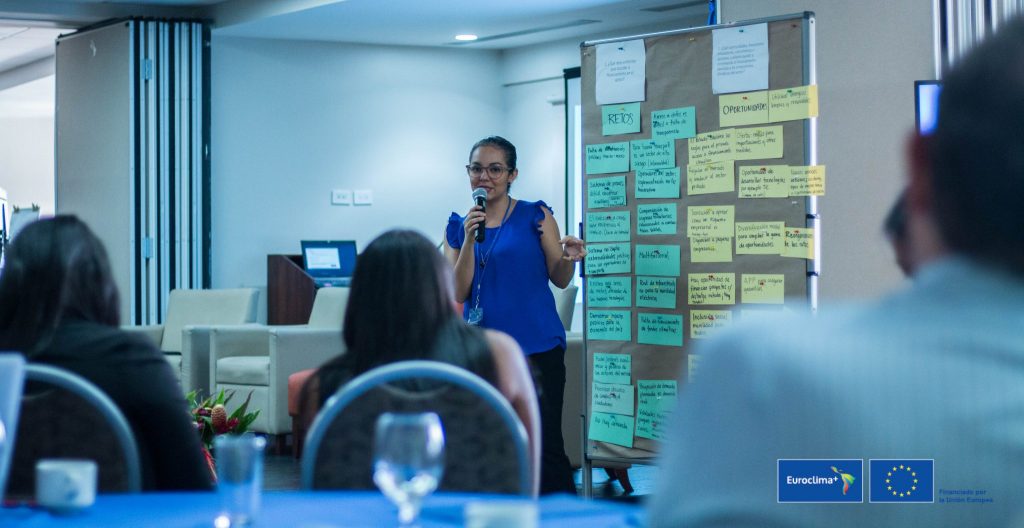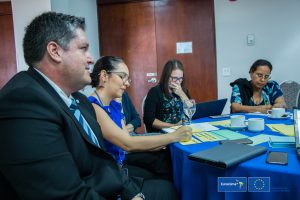
 Timely finance for the implementation of climate actions is both the key and the challenge to be faced according to the discussions of the V Regional Dialogue on Climate Finance. The two-day dialogue – which took place in San José Costa Rica last March – explored opportunities and demands in the development/business models of local and national governments as well as of financial entities in order to accelerate the structural transformations required to tackle Paris Agreement´s goals. The event organized by EUROCLIMA+ was followed by the CEPAL workshop: The role of Development Banks in the implementation of the Paris Agreement: financing options for low emission urban mobility.
Timely finance for the implementation of climate actions is both the key and the challenge to be faced according to the discussions of the V Regional Dialogue on Climate Finance. The two-day dialogue – which took place in San José Costa Rica last March – explored opportunities and demands in the development/business models of local and national governments as well as of financial entities in order to accelerate the structural transformations required to tackle Paris Agreement´s goals. The event organized by EUROCLIMA+ was followed by the CEPAL workshop: The role of Development Banks in the implementation of the Paris Agreement: financing options for low emission urban mobility.
Among the thematic discussed, integral analysis and alignment of NDCs was pointed out as fundamental to identify and prioritize finance options. Within those financial options, several of the discussion panels delved into the role, challenges and opportunities of international cooperation, development banks, green fiscal reforms and public-private partnerships.
The use and design of green fiscal instruments and other enabling conditions to move internal resources to climate finance was one of the topics of the dialogue. Joy Aereen Kim, from UN Environment, presented her research on international experiences on green fiscal reforms and carbon taxes. She concluded that green fiscal policies must be carefully designed, taking into consideration compensation measures, complementary policies and clear communication to the stakeholders. For example, when it comes to the transport sector, the subject of subsidies of fossil fuels in many countries was presented as a delicate issue and a threat to transition to cleaner technologies.
Under this framework, different perspectives and experiences from Chile, Costa Rica and Peru showed that the approach to the subject must seriously take into consideration political context and conditions for implementation. Also, as learned from the Carbon tax case of Chile, a green fiscal reform can become an opportunity to reorganize institutions and governance as well as to discourage harmful practices, even if the tax income is not very significant.
About development loans, several international financial institutions conducting development-oriented finance, pointed out that climate projects are often not bankable. Even though the resources are available, the projects present high risks and weak guaranties, especially if they are requested by cities or local governments. A need to strengthen local capacities to access to loans and to establish financial conditions tailored maid for cities was among the conclusions presented on this matter.
The access to multilateral funds can be accelerated by the current implementation of international cooperation projects. These projects result as important leverage and risk management opportunities. It is strategic to align the design and evolution of international cooperation with the consolidation of bankable projects.
Day two had hands-on sessions, with two dynamics that aimed to identify both the demand and the offer of climate finances. The workshop-like sessions first focused on the challenges and opportunities of specific sectors: forests, biodiversity and ecosystems, disaster risk management, urban mobility, resilient food production and energy. Afterwards, through a match-making exercise, organizations such as NDC Partnership,
EUROCLIMA+, GIZ, ALIDE, AFD, C40, SIF among others showcased their offer and general finance conditions to the country and city representants. This dynamic highlighted the fact that there is a climate finance offer, but alignment between offer and demand must be further develop.
At the end of day two, a study developed by the Governance Component of EUROCLIMA+ to improve finance access for NDC implementation was presented. The mechanism designed in this study to support NDC finance in Latin America is about to start implementing a pilot phase, definitely a must follow pilot under the above described context.
EUROCLIMA+ is funded by the European Union and implemented by five European agencies. Implementing agencies for the urban mobility component are GIZ and AFD.
You are currently viewing a placeholder content from X. To access the actual content, click the button below. Please note that doing so will share data with third-party providers.
More Information